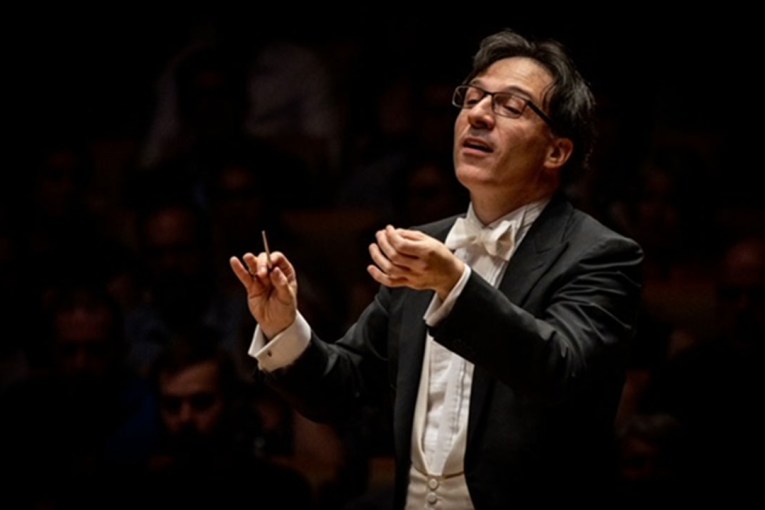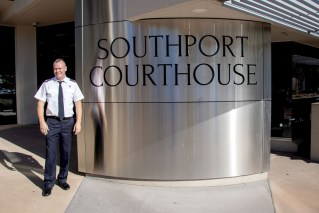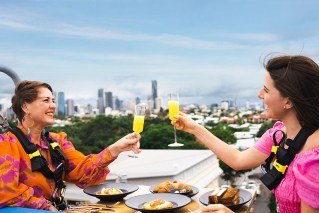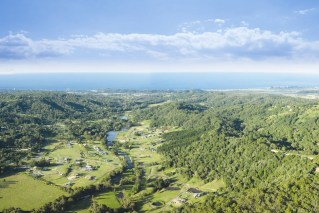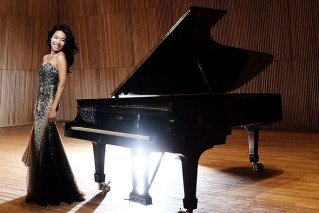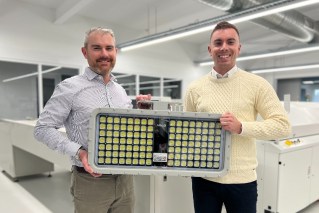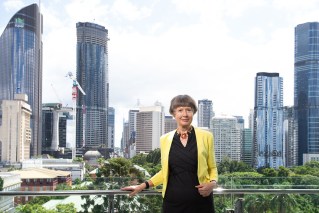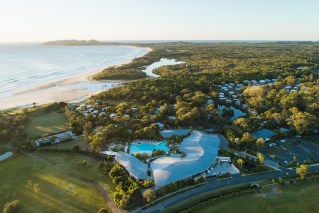How the Gold Coast got its groove back – even though dancing’s not allowed
The Gold Coast’s live music scene is bouncing back and emerging as a hot-ticket showcase for local artists – even if pandemic rules mean gigs have all become intimate, sit-down events.
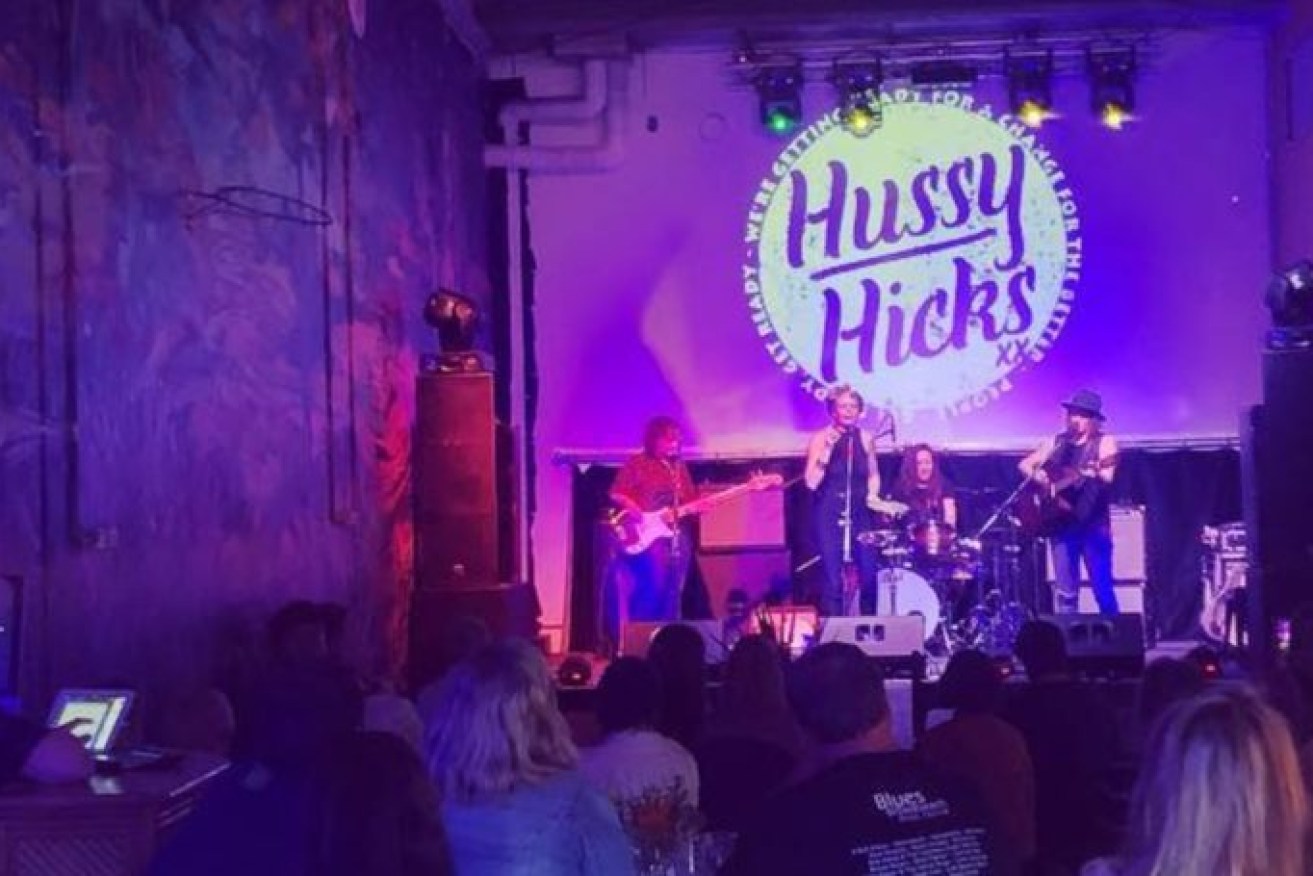
Hussy Hicks guitarist Julz Parker says 97 per cent of the band's income comes from live performances.
Gold Coast venues, like Mo’s Desert Clubhouse, a live music and art venue in Burleigh Heads, have fought hard to relaunch live music in line with coronavirus restrictions and tap the talent pool trapped in Queensland by border lockdowns.
“We had a metal gig here on Friday night and had 50 people sitting down at tables thrashing their heads,” said Mo’s Desert Clubhouse co-director Kim Ferguson, who has booked bands for at least three nights a week until October.
“It’s different, but it’s working.”
Mo’s joins Miami Marketta and Vinnies Dive Bar among the Gold Coast’s major live music venues that have been busting to return live music to Gold Coast stages, with gigs currently rolling out including Tex Perkins, Hussy Hicks, Jack Botts, Ash Grunwald and Russell Morris.
Gold Coast Music Advisory Group Chair Dean Gould said while international artists may not tour until 2023 and many big-name national acts were still locked out of Queensland, there was plenty of live music talent.
“It’s really starting to look like there’s a recovery coming,” Gould said.
“The great thing is there’s a lot going on.”
Miami Marketta co-ordinator Emma Milikins said the first sounds of live music were surreal following a six-month COVID-induced break that hit straight after a final Sunnyboys gig in February.
“We have to be very fluid with our booking and keep in the back of our minds that it could all be cancelled again,” Milikins said.
“It’s for the artists but it’s also for the mental health of our team,
“That’s why we’re pushing forward and staying open and being master pivoters and being really fluid – the team’s really strong and every time something new happens or a new restriction, we roll with the punches.”
Milikins said artists were also responding to the opportunity to perform live after lockdown.
Rock music veteran Tex Perkins was among the first to return to the Miami Marketta stage.
“That guy has gigged like for 30 years and when they were sound checking they were like little kids, they were so excited to be gigging again,” Milikins said.
“I could hear them say that they didn’t know when they would get to gig again, it might be another six months.”
Other artists were escaping border lockouts so they could perform at Gold Coast venues, Milikins said.
Northern NSW-based blues musician Ash Grunwald said he had to leave home to head to Queensland more than a week ahead of his gig to avoid the most recent border shutdown because he lived 10km outside the border bubble.
“It’s commitment, but this is what we do right now,” Milikins said.
Ferguson, from Mo’s Desert Clubhouse, said audiences were also enjoying the return of live music with pent-up demand constantly selling out Gold Coast shows.
However, due to COVID restrictions that limited the number of patrons and required audiences to remain seated, that meant a capacity audience of 50 at Mo’s Desert Clubhouse, as well as triple the staff.
“While it’s great to have live music going again, all the regulations need to be in place and that makes it quite hard,” Ferguson said.
“But if they keep the borders closed and keep going on this trajectory we should be right.
“If what happened in Melbourne happened to us, a lot of venues would have to shut up shop and that would be it.”
Gold Coast Music Advisory Group Chair Dean Gould said supporting venues was vital to the live music resurgence and ability for artists to continue performing live to paying audiences.
Gould said Queensland Government and Gold Coast City Council support had helped prioritise the return of live music, along with creative solutions to take music to audiences.
“The venues themselves are trying to do as much as they can. We’re calling on as many people as possible to respond to the venues when they’ve got events because that will give them a little bit of income and little bit of momentum.
“Venues are the linchpin to all of this – if we’ve got live music venues, we’ve got the places where people can gather and bands can play and there’s a business model built around it, which means customers are willing to pay and artists get paid.”
He said working within restrictions had unleashed creative new ways to take music to audiences, as well as introduced new audiences to some bands.
To deliver the feel of an all-day festival, the Mo’s Desert Clubhouse crew teamed up with Vinnie’s Dive at Southport to introduce the Pineapple Club, a one-day dual musical bus adventure that showcased bands across the two venues.
Following the sold-out first tour, a second Pineapple Club adventure will be held in October.
“We’ve even had punk concerts delivered in recent weeks to sit-down audiences which is anathema to a punk band,” Gould said.
Gold Coast-based folk/roots/blues band Hussy Hicks said being able to play live was integral to artists’ ability to continue creating.
Guitarist Julz Parker said as much as 97 per cent of Hussy Hicks’ earnings came from live music.
“With Spotify and streaming, a lot of the revenue for musicians for the past few years has been tied up in live music,” she said.
“Live music was the last sort of financially viable part of our industry.
“We really enjoy playing and hopefully we’ll get to play some more shows. We’re very much a live band and what we do is play music to people.”
Milikins said showcasing local bands to audiences thirsty for live music could have a lasting impact on the live music industry.
“I think it’s really good to be putting on locals and putting on ticketed shows and changing the worth of music on the Gold Coast, because for a long time it’s been a free commodity,” she said.
“People want to come and watch them play and these bands can sell tickets which turns their music into a more worthy product.”
Ferguson agreed that while the intimate audience experience at live music venues was different, the changes could be positive.
“At gigs people aren’t always sitting down listening to the bands, but now people are sitting down because they have to, but they are actually watching the bands which is really nice to see and they are really listening, which could change the way audiences perceive artists and build fan bases are built for artists as well.”

